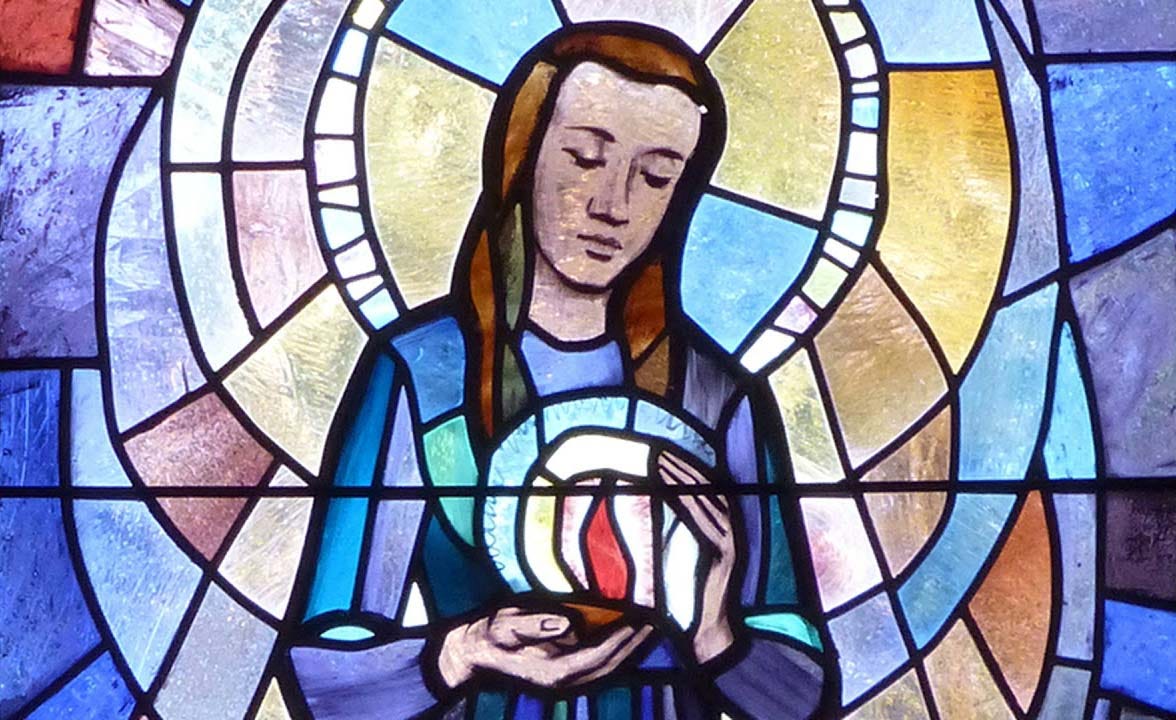St. Maria Goretti is not the problem—we are
[Maria Goretti is a saint. How Catholics think and talk about her story can be harmful to survivors of sexual violence.]
Today, July 6, is the feast day of Saint Maria Goretti, a turn-of-the-20th-century Italian girl who at the age of 11 was stabbed to death by a 20-year-old man named Alessandro Serenelli, whose repeated sexual advances she had spurned. She is known for her reported words of resistance—“No, no, Alessandro, God does not want it. It is a sin. You would go to hell for it”—and for forgiving her murderer from her hospital deathbed.
Maria Goretti is venerated as a patron of those who have endured rape and sexual assault. Yet for many survivors of rape and sexual assault, Maria Goretti—or, rather, the ideas, assumptions, and language associated with popular veneration of Maria Goretti—can be disturbing rather than comforting. Rebecca Hamilton, in a 2015 post at Patheos, articulated two impressions often created by devotion to Maria Goretti: that, according to Church teaching:
it is better to die than suffer rape and live, and
if a woman really wants to, she can avoid being raped.
Such notions are unfortunately common in many traditional societies, along with the honor-culture idea that a woman who suffers rape is damaged goods and brings shame to her family. None of these, it is perhaps necessary to say, reflect Church teaching or sacred tradition. As St. Augustine wrote in The City of God:
While the will remains firm and unshaken, nothing that another person does with the body, or upon the body, is any fault of the person who suffers it, so long as he cannot escape it without sin.… Is there a fear that even another’s lust may pollute the violated? It will not pollute, if it be another’s.… Since no one, however magnanimous and pure, has always the disposal of his own body, but can control only the consent and refusal of his will, what sane man can suppose that, if his body be seized and forcibly made use of to satisfy the lust of another, he thereby loses his purity?
Going further, St. Thomas Aquinas declared that suffering rape can be “a kind of martyrdom” and count “for the merit” of the victim; he also wrote that virginity is not lost by rape.
Yet this kind of “martyrdom” seems to have left no record in Catholic martyrologies. Many women saints are venerated for resisting rape or sexual assault, including many virgin martyrs who endured grotesque mutilations graphically recounted in hagiography. Like Maria Goretti, such virgin martyrs are often honored as patrons of those who have endured rape and sexual assault. Yet it’s virtually impossible to identify a canonized saint who is known to have been raped.
Nor has the language of Catholic piety always carefully protected the moral truths affirmed by Augustine and Aquinas, even at the highest levels. Pope St. John Paul II, on the occasion of the 100th anniversary of Maria’s birth, stated that “She chose death when there was no other way to defend her virginal purity.” Pope Pius XII, in his 1950 homily for her canonization, declared:
With splendid courage she surrendered herself to God and his grace and so gave her life to protect her virginity. She preferred to die rather than to lose her virginity. She was stabbed to death, preferring to die rather than be raped.
I have a special love for both of these popes, but there’s no getting around the fact that their language at least appears to imply that, had Maria actually been raped, she would have lost her purity and her virginity. Notably, as Simcha Fisher pointed out in another 2015 Patheos post, Maria’s reported words during the final attack were not “No, no, Alessandro, spare my virginity!” but “You would go to hell for it.” His soul, not her purity, was at stake.
Yet that’s not the message that, by and large, the Church has communicated to survivors of sexual violence. We need to do better.
Related: I’ve written before about problems in Catholic culture in connection with Maria Goretti’s story—including problems in her own culture—in a 2021 piece for Catholic Herald (“Maria Goretti’s silence was tragic, not heroic, and not a model for us”). And I recently touched briefly on Maria’s story reviewing Irena’s Vow, a fact-based movie about a Polish nurse who submits to sexual assault by a Nazi officer in order to save the lives of Jews in hiding.






Maria Goretti’s story appeared in every religious education textbook I was assigned in my parochial schools from sixth grade onward. The lesson was always that death was preferable to impurity. Once, in sophomore year of high school, one of the guys brought up St. Augustine’s comment mentioned here (this kid was a sort of insufferable religious nerd). The answer given by the Marist brother teaching the class was that Augustine’s pious opinion had been overruled by the sensus fidelium. This was a Catholic school in the liberal northeast, by the way.
So, since the Magisterium has heavily implied that the lesson of Maria Goretti is exactly what is being called into question here, and since it is the Magisterium who is empowered by the Holy Spirit the interpret such things, and since such a notion exactly matches the purity culture I’ve been taught, why shouldn’t I take this as just another one of Christ’s many “hard sayings” and believe simply that God doesn’t love the individual as much as He loves the abstract qualities (like purity) that individual may or may not come to embody?
Well done! I have never heard before that rape doesn’t destroy virginity. It’s a comforting thought.